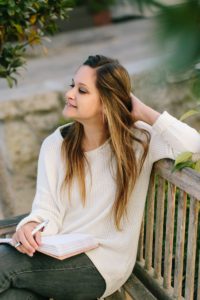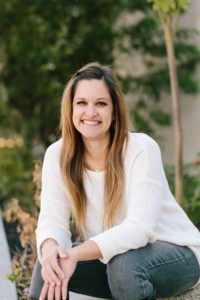

Today, Feathered Quill reviewer Anita Lock is talking with Katie Keridan, the author of Once Upon A Girl
FQ: You mention in the book’s bio that you’ve wanted to be a writer “ever since I can remember.” Can you recall that turning point?
 KERIDAN: For me, writing has always been a way to make sense of things. Slowing down and reproducing experiences one letter at a time has helped me better understand the world around me, as well as the ever-changing landscape inside my own head. As a child, writing initially allowed me to describe things that were important to me, validating them and giving them a permanence at a time when things seemed to change so fast. It then allowed me to control things – specifically, to make sure that the ending would be happy – at a time when I felt unable to control much of what was happening in my life.
KERIDAN: For me, writing has always been a way to make sense of things. Slowing down and reproducing experiences one letter at a time has helped me better understand the world around me, as well as the ever-changing landscape inside my own head. As a child, writing initially allowed me to describe things that were important to me, validating them and giving them a permanence at a time when things seemed to change so fast. It then allowed me to control things – specifically, to make sure that the ending would be happy – at a time when I felt unable to control much of what was happening in my life.
FQ: Again, from your bio, you mention: “The stories and poems I read as a child shaped me into the person I am today.” Which writers (authors/poets) inspired you over the years, and how?
KERIDAN: I grew up loving John R. Erikson, Laura Ingalls Wilder, Beatrix Potter, Thornton W. Burgess, Bonnie Bryant, and Ann M. Martin. Many of the authors used animals to teach “life lessons,” and I liked learning vicariously without having to make all the same mistakes for myself. I also liked stories with strong female characters who valued family, friends, and actively solving problems.
FQ: What are some favorite book titles, and why did these books make an impression on you growing up?
KERIDAN: This list could be pages long, so I’m limiting myself to three:
The first is a series, rather than one single book – the Hank the Cowdog book series by John R. Erikson. I read those books over and over again, and I also wore out the audiotapes I’d borrow from the library, listening to them as I fell asleep. Hank was such an endearing character…he made so many mistakes, but his heart was always in the right place. The books felt familiar (they took place on a ranch, I grew up on a ranch), and they were filled with humor. They taught me that, even when things seem terrible, there is always a reason to laugh.
The second book is Sabriel, by Garth Nix, the story of a young woman with magical powers who leaves behind the world she knows to fulfill her destiny as a necromancer called the Abhorsen. I was immediately captivated by the mixture of strength and vulnerability in the character. She was simultaneously mysterious and relatable, and I just love that she failed and grew and learned and fought for what was important to her.
The third book is The Book Thief, by Markus Zusak. That book broke my heart in all the right ways. It taught me that, no matter the circumstances, there is always beauty to be found. It always made me dream of one day writing something even a fraction as beautiful…something that settles into your bones and acts as a demarcation between before I read this and after I read this.
FQ: Your main purpose for writing Once Upon a Girl is to raise awareness to low self-esteem and provide hope for those who feel hopeless. You mention in your bio that what you read as a child made you “feel strong and smart and hopeful.” Obviously, an accumulation of events that took place in your life, left you high and dry and misdirected before you had to reinvent yourself. What words of hope would you offer to those who have lost their way and have bought into hopelessness?

KERIDAN: Reinvention is always possible. You are never too far gone to get where you want to go. That doesn’t mean it’s going to be easy, only that it’s possible.
FQ: You paint metaphors throughout Once Upon a Girl. Name one metaphor you hope readers will find relatable and hopeful?
KERIDAN: I hope readers relate to the metaphor of being their own rescuer – don’t sit inside the castle, bemoaning the fact that you’re trapped, waiting for someone to save you. Save yourself! Leave the castle, find a dragon to help you burn it down, if need be, make your way through the woods, and make your own happily ever after.
FQ: One strong theme inferenced in your poems is codependency. While the term is often related to alcohol or drug addiction, the reality is that it works with relationships, too. A vicious love-hate (often passive-aggressive) cycle develops among people of low self-esteem who develop a false sense of love. What words of advice would you offer to those who find themselves going from one codependent relationship to the next?
KERIDAN: In looking at my own life, my co-dependency was classic “looking for love in all the wrong places,” to borrow a line from the country song. Humans are created for connection, and sometimes we become so desperate for it that we’re willing to do anything to have it. Real relationships never involve desperation! They involve choice and respect. Ask yourself the hard questions and answer honestly (perhaps with the help of a professional therapist or someone you trust)…does this person make me feel good about myself? What have I changed in order to stay with this person? What will happen if I stand up for myself? Why do I fear not being in a relationship? Until you address the root of your co-dependency, you’re very unlikely to change it.
FQ: You incorporate more storytelling in your poetry, which allows readers to join you on your personal journey to reinvention. Do you see yourself continuing in this style, or delving into novel writing?
KERIDAN: I hope to do both! I want to continue writing poetry and using it as a vehicle to connect with others and remind them that they aren’t alone. At the same time, I love the style of a novel, where you can work in a longer time frame and have the freedom to bring in different perspectives.
FQ: If there is one thing you hope readers will take away from your book, what would that be?
KERIDAN: It would be the unwavering belief that they, too, can reinvent themselves.
FQ: Do you envision yourself doing counseling, volunteer or otherwise?
KERIDAN: When I’m not writing, I’m actually a pediatric neuropsychologist. I specialize in cognitive testing with children and adolescents, many of whom have a chronic medical condition or have experienced a brain injury. I identify their unique learning strengths and challenges, and this helps them receive the support they need, both at home and at school. It also helps them realize that they aren’t “stupid” or “bad.” I’m especially passionate about identifying dyslexia, as no child should ever miss out on the joys of reading simply because of how their brain is wired.
FQ: Do you have any project in the works? If so, can you give your audience a peek into your new writing venture?
KERIDAN: I’m currently working on a fantasy novel that’s a coming-of-age story involving (surprise, surprise) a female protagonist who learns to stand up for what she believes in, even when doing so means making very hard choices. At the same time, she also discovers that some of the things she believes in are not as infallible as she’s been told, and this will require change on her part. The book is currently with my editor, and I hope to have it finished and published this year.
Disclosure in Accordance with FTC Guidelines 16 CFR Part 255
Copyrights © 2023 Feathered Quill Reviews All Rights Reserved. | Designed & Developed by Unglitch.io